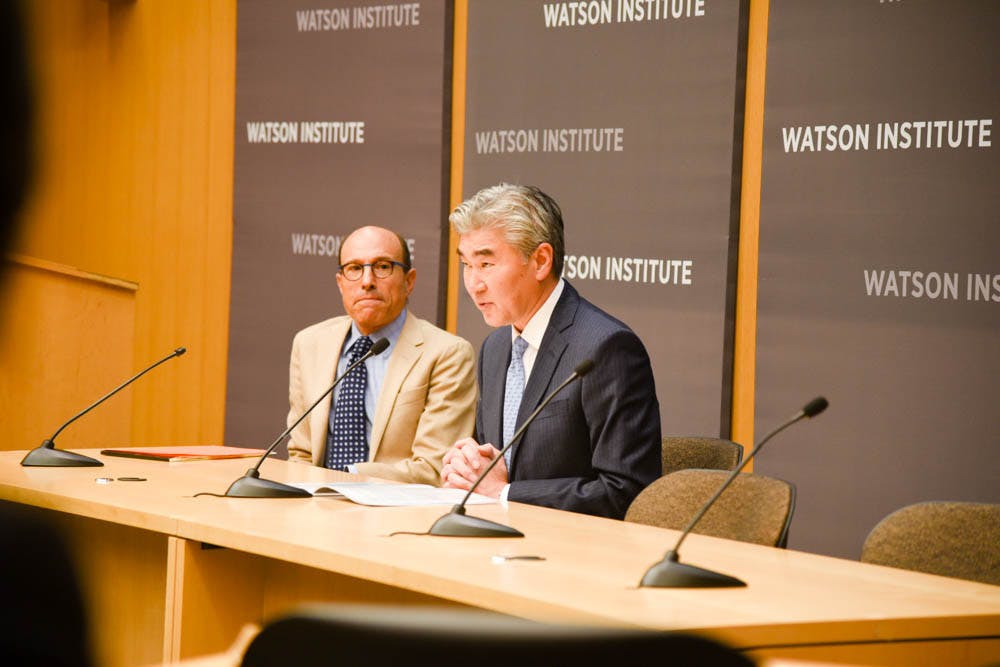U.S. ambassador to the Philippines, Sung Kim P’22, spoke about the importance of U.S. involvement and foreign policy in the Indo-Pacific during a forum titled “Old Friends, New Frontiers” at the Watson Institute for International and Public Affairs Tuesday.
Before entering the field of diplomacy, Kim worked as a public prosecutor for the Los Angeles County District Attorney’s Office. Interested in foreign policy and drawn to the idea of living overseas, he planned to work in diplomacy for only a couple of years before returning to his job as a prosecutor. However, he came to enjoy diplomacy work so much that “those two years have now become thirty years,” Kim said in an interview with The Herald. Having also served as the U.S. ambassador to South Korea, Kim is currently awaiting Senate confirmation for his appointment to U.S. ambassador to Indonesia.
Kim’s forum was a part of the Chong Wook Lee and Vartan Gregorian Distinguished Lecture Series. Established in 1992, it aims to “underscore the importance of understanding global issues” and “relying on innovation” from Asia and the U.S. to solve global challenges, said Edward Steinfeld, director of the Watson Institute, during the event’s opening remarks.
Kim stressed the vital importance of the Indo-Pacific to the United States, citing the region’s population of 650 million and its significance as one of the United States’ largest trading partner. Over the past few years, Southeast Asian nations especially have experienced significant growth and now have considerable economic and political impact. “In the past, power and influence in Asia were concentrated among East Asian nations,” he said. “This is not so for the Asia of today — or the Asia of tomorrow.”
The ambassador’s lecture also focused on the indispensability of strong U.S.-Asian partnerships to security and prosperity both in the Indo-Pacific region and the United States. Kim said the most cost-effective investment of U.S. resources consists of partnering with emerging leaders overseas, through exchange programs or higher education opportunities, to create “ecosystems that encourage innovation.” He added that U.S. support of young international change-makers will lead to the development of “personal connections with Americans that create deep and unbreakable bonds.”
Kim’s own experience as the country’s first Korean-American foreign ambassador has allowed him to bridge the U.S. and Asia in a way that has been incredibly fulfilling, he said. Born in Korea, Kim told The Herald that returning to his home country as an ambassador was special to not only him but also Koreans and Korean-Americans because of the example he provides of rising through the ranks of the diplomatic system.
Joyce Lee ’22 said she attended the lecture because, as a Korean concentrating in international relations, she was particularly intrigued by the perspective of a former U.S. diplomat to Korea.
Gina Sinclair ’22 also mentioned her interest in Kim’s unique identity as both a Korean and a representative of the U.S., which puts him “at a crossroads.” Sinclair said she appreciated how Kim answered questions on U.S. policy decisions in a manner that helped the public understand why those decisions were made. “I could also understand where he was coming from, whereas if I listened to the news, I would see the U.S. as making decisions that hurt a lot of lives,” Sinclair said.
Sinclair said she left the lecture inspired to take up a career in foreign service, something that Kim passionately encouraged the audience to pursue. “An individual diplomat can really change the trajectory of lives as a counselor officer sharing visas, can set rules for global trade, can protect human rights as a political officer, can uphold young leaders to excellency,” Kim said. “There’s really no greater privilege than the honor of representing your country overseas.”





